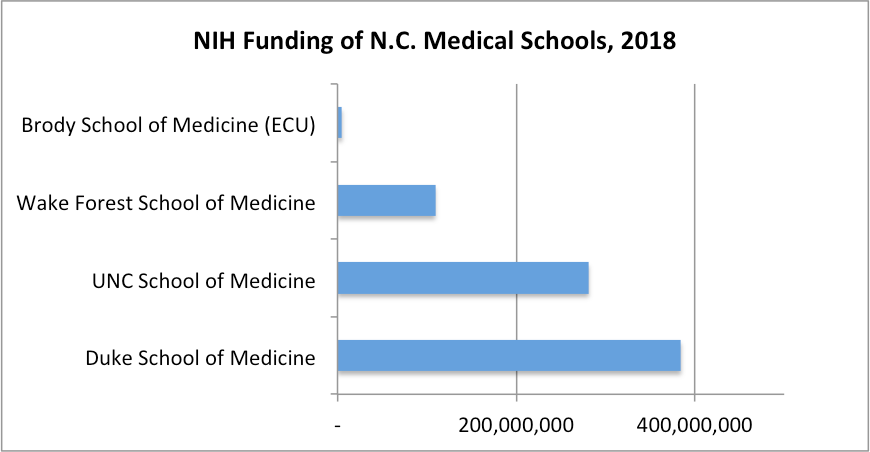How big a deal is this med school?
Atrium and Wake Forest plan 'transformative academic healthcare system'
The following article was published in the April 12, 2019, edition of The Charlotte Ledger, an e-newsletter with original, business-y news and analysis for Charlotte.
Charlotte’s getting a medical school, happy days are here again, and yes, we live in a truly a world-class city!
That was the tone of the announcement on Wednesday that Atrium Health, Wake Forest University and Wake Forest Baptist Health are working together on a four-year medical school in Charlotte. The phrases were lofty: “transformative academic healthcare system … ground-breaking research and innovation … state-of-the-art campus in Charlotte … enriching countless lives and communities throughout North Carolina, the Southeast region and the nation.”
It’s exciting news, thrilling really, since Charlotte has long had an inferiority complex when it comes to higher education. A previous med-school effort between Atrium and UNC Charlotte was dead in the water.
A med school, the thinking goes, would establish Charlotte as a hotbed of cutting-edge medical research. As a city, it would complete us — like an improbable partner in some romantic comedy.
Sometimes, though, saying what you don’t know is as important as saying what you do know. And in trying to assess how big a deal this is, there’s a lot we don’t know. Could this have real significance, like a mega-bank merger of the 1990s that leads to thousands of high-paying jobs? Perhaps. Or could this be like the inaugural US Airways flight to Paris – a nice feather in the city’s cap but with little significance besides bragging rights? Yeah, that’s possible, too. The truth probably lies somewhere in between.
Despite all the hoopla, what Atrium and Wake actually announced Wednesday was that they had signed a memorandum of understanding – essentially an agreement to keep talking. That’s like where you would be if you went on a few dates with somebody and developed an understanding. It doesn’t mean you will get married. (And you don’t have teams of doctors with big egos second-guessing your every decision, either.)
Here are some educated guesses on some of the effects of a Charlotte medical school:
Students
We don’t know how many medical students we are talking about, but it is probably not more than a few hundred. For a four-year medical degree, UNC Charlotte considered starting with a class of 25 students and eventually working up to 50.
Wake Forest currently has 510 medical students, or roughly 125 per class. State regulators don’t have to approve any increases. We don’t know if Wake would shift some of those seats to Charlotte or just add them here. Wake is one of the most selective med schools in the country, with an acceptance rate of less than 2%. Atrium and Wake would also work together on other medical education, like physicians assistants and nursing – Atrium already has more than 400 of those students here.
Real estate
Speculating where this new medical campus will go will be a fun parlor game. Will Atrium continue gobbling up property in Dilworth? Could it go somewhere uptown, where Wake already has a presence (near the Spectrum Center)? A medical school requires classrooms, offices and labs. UNC Charlotte estimated the cost of a new 90,000-square-foot medical building at $50M.
Doctors
Consultants have said that Charlotte faces a doctor shortage in coming years, particularly in primary care and psychiatry. One of the reasons UNC Charlotte passed on a med school is that it believed a med school will not result in that many more doctors staying here. Historically, only 18% of North Carolina medical students wind up practicing primary care in the state. Charlotte has about 5,400 physicians.
Research
We don’t know how much medical research might be done here vs. at Wake Forest. But if Charlotte lands at least some research funding, that could have ripple effects into the local economy. It could lead to Charlotte developing medical-research companies, which the city is now lacking. The Triangle and Triad have many more. Even Winston-Salem has a solid base of medical start-ups. Wake Forest’s medical school last year received about $109M in funding from the National Institutes of Health.

Source: NIH
Quote: “My expectation would be that it would lead to innovation in that space that would manifest itself in more interesting Charlotte-based start-ups in the medical and healthcare space.” – Greg Brown, administrator, Charlotte Angel Fund, which invests in start-ups.
Bottom line: A medical school could be a big deal for Charlotte. Or it could be a small satellite campus of Wake Forest. In the absence of information, our minds fill the void with great hopes and dreams. Let’s keep expectations in check until more details emerge.
Need to sign up for this e-newsletter? We offer free and paid subscription plans:
The Charlotte Ledger is an e-newsletter and website publishing timely, informative, and interesting local business-y news and analysis Mondays, Wednesdays, Fridays and Saturdays, except holidays and as noted. We strive for fairness and accuracy and will correct all known errors. The content reflects the independent editorial judgment of The Charlotte Ledger. Any advertising, paid marketing, or sponsored content will be clearly labeled.
Got a news tip? Think we missed something? Drop us a line at editor@cltledger.com and let us know.
Like what we are doing? Feel free to forward this along and to tell a friend.
On Facebook, LinkedIn, Instagram (@thecharlotteledger), Twitter (@cltledger)
Need an “Essential Charlotte Ledger” T-shirt? Order here.
Executive editor: Tony Mecia; Managing editor: Cristina Bolling; Contributing editor: Tim Whitmire, CXN Advisory; Reporting intern: David Griffith



